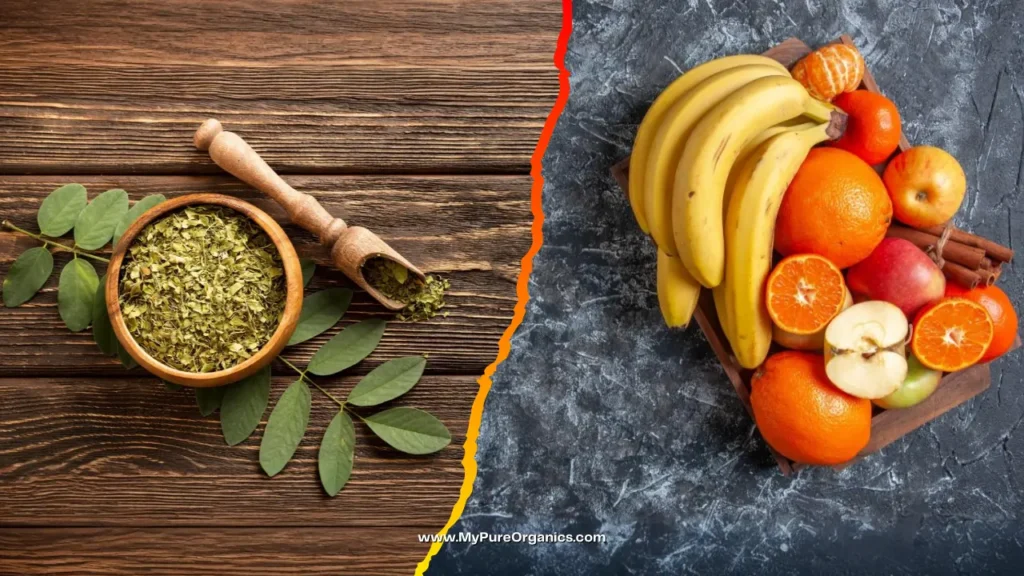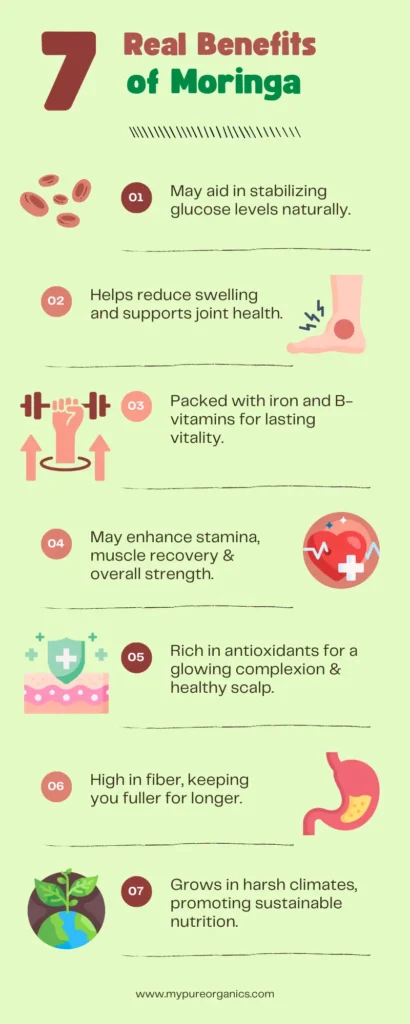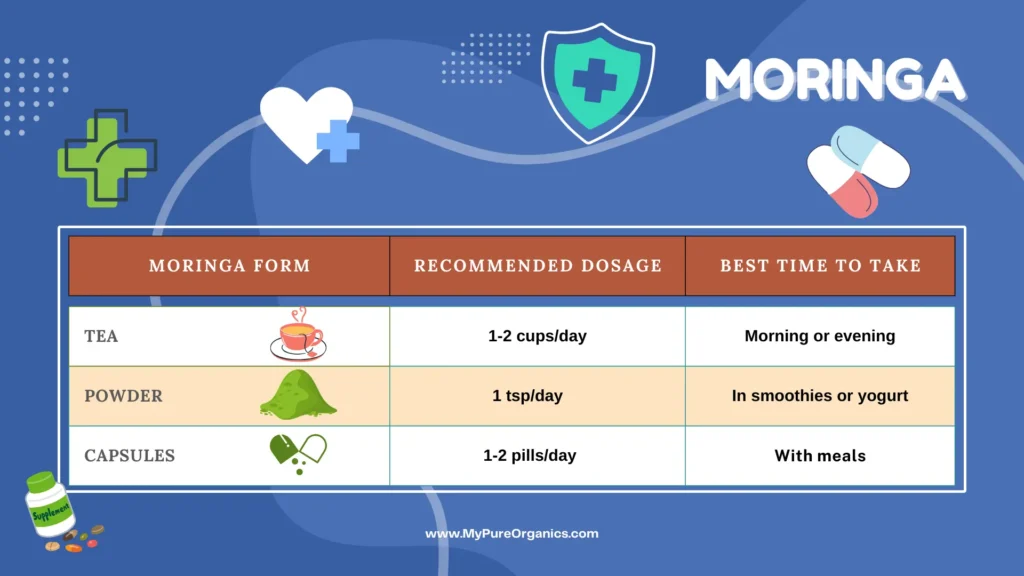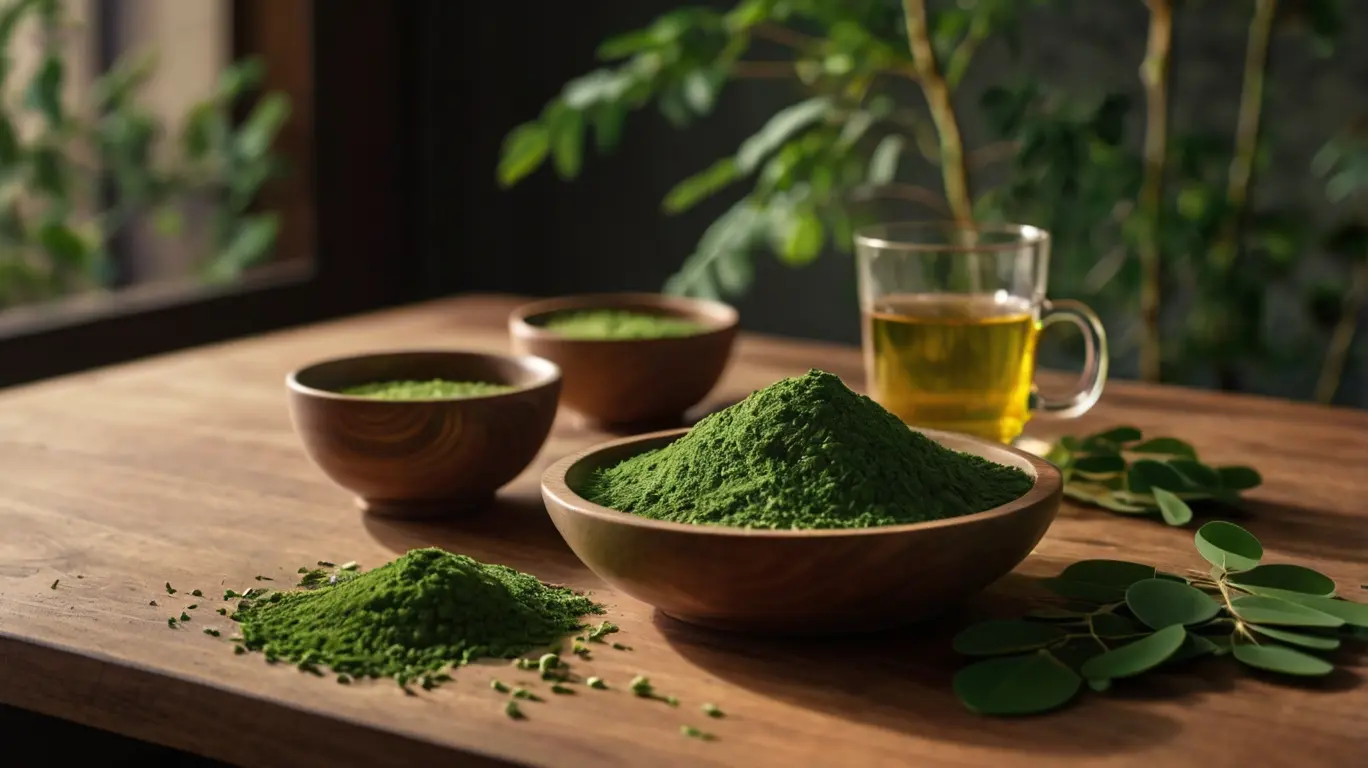Introduction
Explore the science-backed moringa benefits and uses—from reducing inflammation to choosing the right form (tea, powder, or capsules).
You’ve seen moringa in health stores or online. It’s called a “superfood.” But what’s the truth? Is it really that good? Let’s find out.
Think about this: A farmer in India picks leaves from a tough tree. They dry them, grind them into powder. For years, people used it to stay strong. Now, it’s in smoothies and vitamins. Let’s see why.
Quick Fact: Moringa is called the “miracle tree” because it grows fast and feeds millions. But does it work for you? Let’s break it down.
What Is Moringa? The “Miracle Tree”
Imagine a tree that grows fast in dry places. Its leaves have more vitamins than oranges or bananas. Meet moringa.

Why do people love it?
- Packed with nutrients: Moringa leaves have 7x more vitamin C than oranges and 15x more potassium than bananas, according to International Journal of Food Science–published analysis on moringa’s potential health benefits.
- Used in many ways: Tea, pills, oil—it does it all.
Simple fact: Moringa grows where other plants can’t. No fancy soil needed.
History lesson: Ancient healers used moringa for 300+ health problems. Warriors ate it for energy. Now, science proves it fights sickness.
Wait, what’s moringa oleifera?
That’s its fancy name. Moringa oleifera has many other names, including the drumstick tree, horseradish tree, and marango tree, etc.. The leaves, seeds, and pods are all used for health benefits.
How does it taste?
Earthy. Like spinach mixed with green tea. Some love it. Others hide it in smoothies.
7 Real Benefits of Moringa
Let’s get to the point. Here’s what research says:

1. Fights Swelling in the Body
Swelling inside your body can cause sickness. Moringa has stuff called antioxidants that help. Studies have found that moringa can significantly cut swelling, as documented in an updated pharmacological review covering its anti-inflammatory and antioxidant effects.
Try this: Mix moringa with turmeric for extra power.
Why swelling matters: Too much swelling hurts your joints and heart. Moringa helps calm it down.
For a broader look at foods that work hand-in-hand with moringa to tame inflammation, check out this list of naturally anti-inflammatory staples that can fit into any clean-eating plan.
Real-life story: Srishti, a Quora respondent recovering from ACL reconstruction surgery, shared that adding moringa to her diet seemed to support her knee recovery. She noted, that she felt a noticeable difference in her healing speed, and moringa’s anti-inflammatory properties were right there to play a role.
2. May Support Healthier Blood Sugar Levels
Key Takeaway: Early research over a decade (2008–2018) suggests moringa could help lower blood sugar in people with diabetes—but experts say it’s too soon to call it a “complete cure”.
What the Science Says:
A review of 30 studies spanning 10 years found, in a scoping review of clinical and preclinical trials, that moringa intake may help lower blood sugar in certain populations.
- In humans: 5 out of 7 trials showed moringa significantly lowered blood sugar in diabetic patients (using powdered leaves).
- In animals: 21 out of 23 studies saw similar drops (often with liquid extracts).
But here’s the catch:
- Results are mixed across studies.
- Most human trials are small and short-term.
- No long-term data on whether moringa reduces diabetes complications (like nerve damage) or HbA1c (average blood sugar over months).
How to Use It (If You’re Diabetic):
- Powdered leaves: Try adding ½ tsp to meals like soups or smoothies.
- Timing matters: Some studies suggest taking it 30 minutes after eating for better glucose control.
- Always talk to your doctor first—moringa might interact with diabetes meds like insulin.
- Never replace prescribed meds with moringa—use it as a potential complement.
The Bottom Line:
While moringa shows potential for blood sugar management in diabetes, it’s not a magic fix. Think of it as a small piece of your diabetes care plan—alongside diet, exercise, and medical advice.
3. Gives Energy Without Crashes
Tired after lunch? Moringa has iron and B-vitamins.
- One person said: “I swapped coffee for moringa tea. No crash!”
Iron tip: If you’re low on iron, moringa helps. But don’t skip doctor visits.
Science fact: Iron helps your blood carry oxygen. More oxygen means more energy.
Pairing moringa with time-tested traditional energy foods such as panjeeri can create a steady fuel source for the day, without the blood-sugar dips common after refined snacks.
4. Good for Men’s Health
Guys, listen. Moringa might help with energy and muscle.
- An experimental study on animals showed higher energy levels, as observed in an animal model study on moringa leaf extract and muscle performance.
But wait: Human studies are still needed. Don’t expect miracles overnight.
Gym tip: Some athletes mix moringa powder with protein shakes. They say it helps with recovery.
5. Moringa for Skin & Hair Health
Moringa seed oil is great for dry skin or dandruff.
- Studies have shown that moringa seed oil promotes better scalp health, according to laboratory findings on moringa seed oil’s potential anti-hair loss properties.
DIY trick: Mix moringa oil with coconut oil. Rub it on your scalp.
Skin bonus: Moringa fights acne! Its antibacterial stuff keeps pores clean.
Beauty hack: Mix moringa powder with honey for a face mask. It brightens skin in 10 minutes.
If you’re building a full-body glow routine from the inside out, moringa works even better alongside skin-nourishing organic produce rich in antioxidants and healthy fats.
6. Helps You Feel Full Longer
Moringa has fiber. Fiber keeps you from overeating.
- People who added moringa to their diet tended to eat fewer calories.
Recipe idea: Add moringa powder to oatmeal. It keeps you full till lunch.
Snack tip: Moringa energy balls (dates + moringa + nuts) curb cravings.
7. Good for the Planet
Moringa grows in dry areas. It doesn’t need much water. Groups use it to fight hunger.
Example: In Malawi, families grow moringa for its benefits and to feed kids. It’s cheap and grows fast, as detailed in a development report on moringa’s role in Malawi’s nutrition and agriculture programs.
Eco-fact: Planting moringa helps fight soil erosion. Its roots hold dirt together.
Moringa Benefits & Uses: Comparing Tea, Pills, & Powder

Quick advice:
- Hate the taste? Add ginger or lemon.
- Start slow. Too much can upset your stomach.
Pills can be tricky: Some brands hide cheap stuff. Look for “moringa leaf” on the label.
Moringa Powder pro tip:
- Mix it with yogurt or peanut butter.
- Bake it into muffins (use low heat).
Moringa Tea hack:
- Steep with mint or cinnamon for flavor.
- Drink before bed—it helps you relax.
Where to buy Moringa:
- Local stores: Check aisles containing organic vegetables and organic products.
- Online: Read reviews to avoid fake products.
Safe Moringa Use: Balancing Its Health Benefits with Practical Safety Measures
Moringa isn’t perfect. Here’s the truth:
- Pregnant? Avoid it. It could hurt the baby.
- On meds? Ask your doctor. Moringa might mess with blood thinners.
- Bad brands exist. Some powders have metals. Buy trusted names.
Don’t believe lies: Moringa won’t cure cancer. Ignore those claims.
Side effects
- Stomach pain if you take too much.
- Headaches (rare).
How to pick safe moringa
- Look for “USDA Organic” on the label.
- Check reviews online.
- Avoid super cheap brands.
Example: Brand X tests for heavy metals. Brand Y uses fake fillers.
Useful Moringa Recipes (Simple & Quick)
1. Morning Energy Smoothie
- 1 banana
- 1 tsp moringa powder
- 1 cup almond milk
- 1 tbsp peanut butter
Blend and enjoy!
2. Salad Dressing
- 2 tbsp olive oil
- 1 tsp moringa powder
- 1 tbsp lemon juice
- Salt and pepper
Mix and pour over veggies.
For healthy and organic salad ideas, visit the recipes section.
3. Relaxing Moringa Tea
- 1 tsp moringa leaves
- Hot water
- Honey (optional)
Steep for 5 minutes.
4. Moringa-Powered Energy Balls: Simple & Nutritious
- 1 cup dates
- 1/2 cup nuts
- 1 tsp moringa powder
Roll into balls. Refrigerate.
5. Moringa Veggie Omelette
- 2 eggs (or chickpea flour batter for vegan option)
- 1 tsp moringa powder
- ½ cup diced bell peppers
- ¼ cup chopped spinach
- Salt and pepper to taste
Whisk eggs (or batter) with moringa powder, fold in veggies, and cook in a lightly oiled pan until firm.
Packed with protein, antioxidants, and micronutrients, this omelette makes a quick, energizing breakfast or light dinner.
Should You Try Moringa?
If you want more energy or better health, try moringa. Start small. Use tea or pills.
Remember: No food fixes everything. Eat healthy meals first.
A balanced diet that supports your immune defenses is the smartest backdrop for adding moringa—start with this roundup of nutrient-dense immune supporters that science actually backs.
FAQs
Yes! Add it to soups, salad dressings, or energy balls.
It’s earthy. Mix with cocoa or fruit to hide the flavor.
Not sure. Use a tiny bit and ask a doctor.
Energy? Maybe 1-2 weeks. Blood sugar? Give it 3-6 months.
Yes! It needs sun and little water. Perfect for hot climates.
It has more nutrients. But eat both for a balanced diet.
Ask a vet. Small amounts might be safe for dogs.
Yes. Powder lasts 1 year. Store it in a cool, dark place.
No proof yet. Try chamomile tea instead.
Yes. But check labels for cross-contamination.

